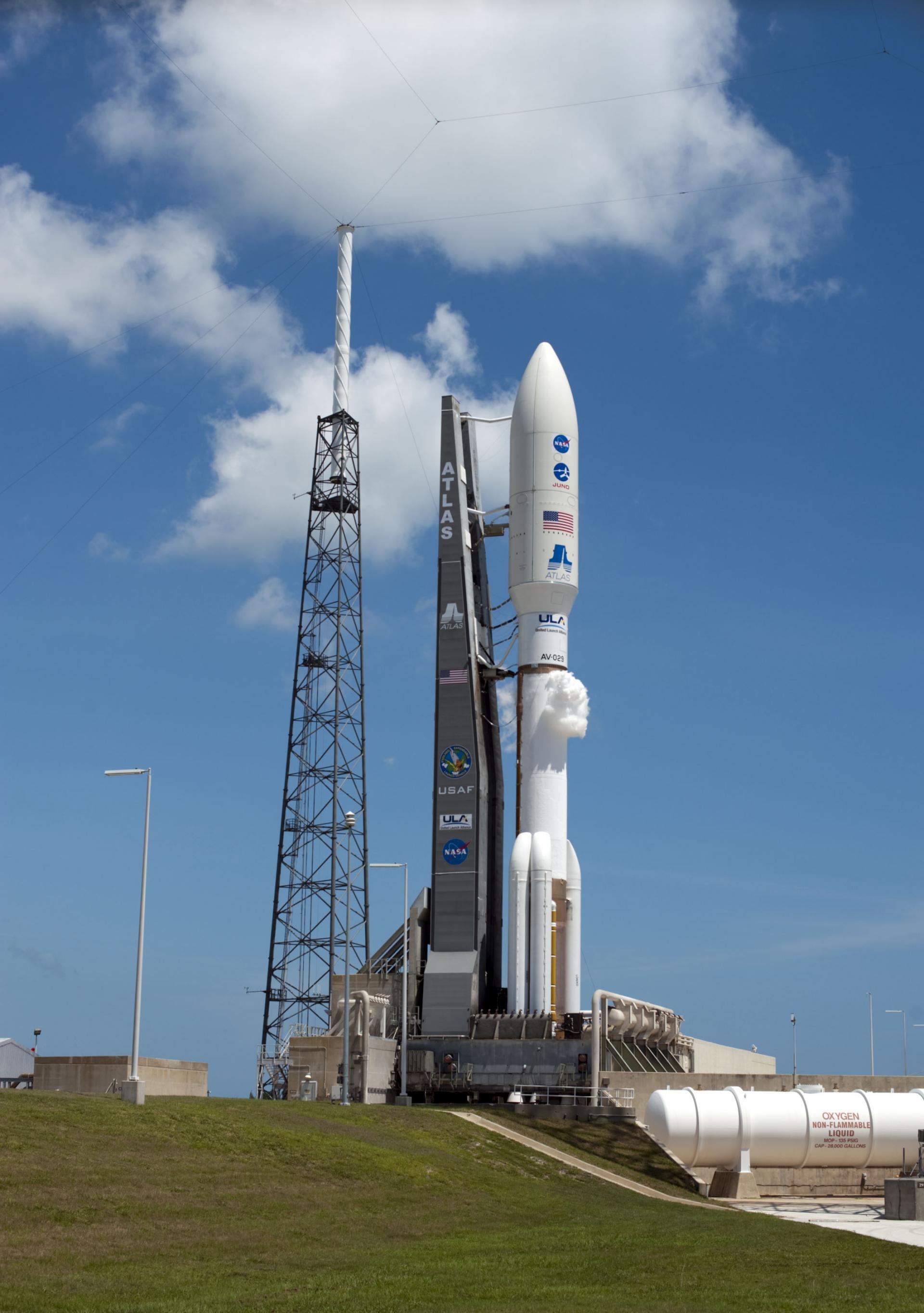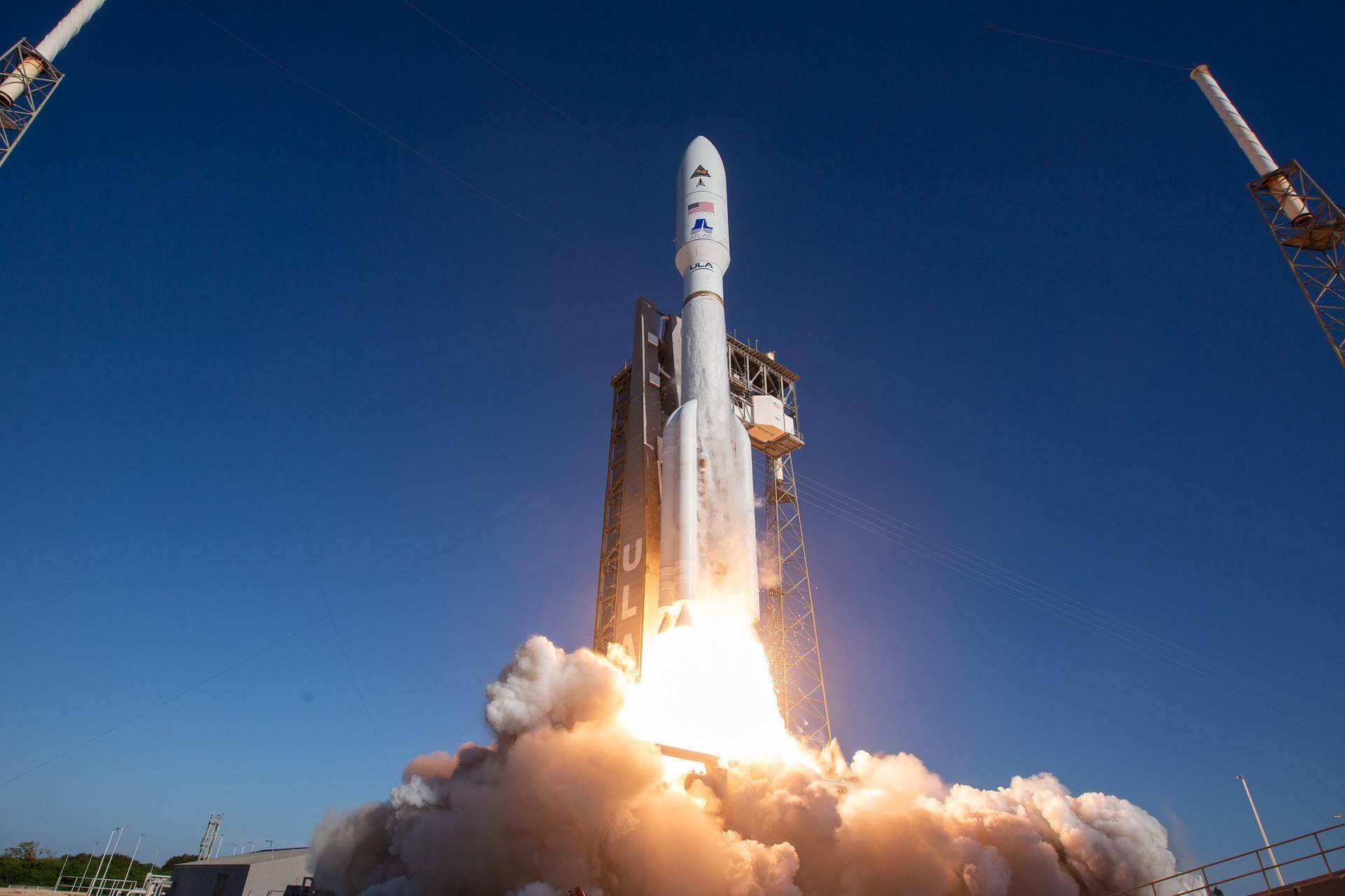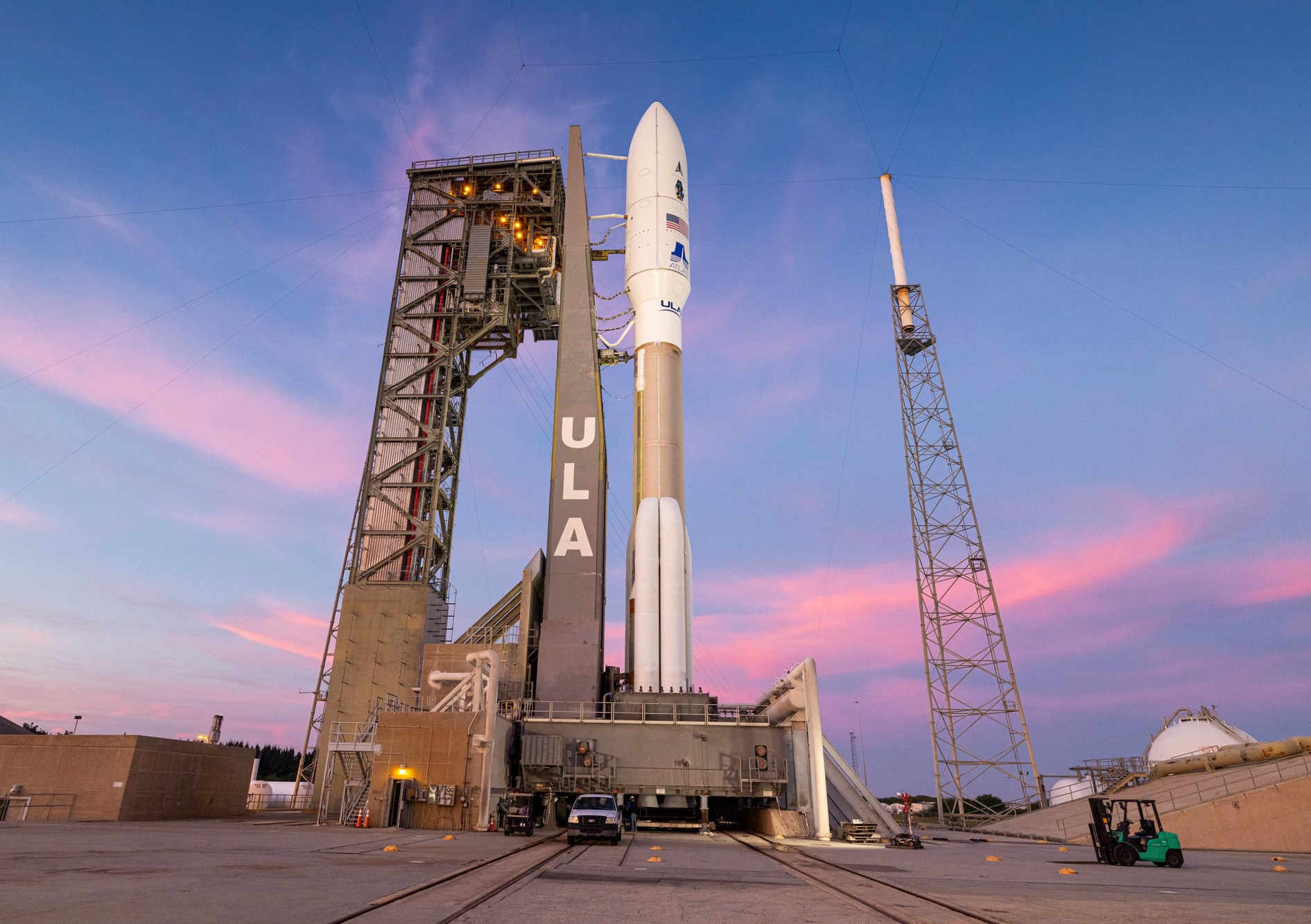
Atlas V 551
Active AtlasUnited Launch Alliance (ULA)
Jan. 19, 2006
Description
Atlas V is an expendable launch system in the Atlas rocket family. It was formerly operated by Lockheed Martin and is now operated by United Launch Alliance (ULA), a joint venture with Boeing. Each Atlas V rocket uses a Russian-built RD-180 engine burning kerosene and liquid oxygen to power its first stage and an American-built RL10 engine burning liquid hydrogen and liquid oxygen to power its Centaur upper stage. The RD-180 engines are provided by RD Amross, while Aerojet Rocketdyne provides both the RL10 engines and the strap-on boosters used in some configurations. The standard payload fairing sizes are 4 or 5 meters in diameter and of various lengths. Fairings sizes as large as 7.2 m in diameter and up to 32.3 m in length have been considered. The rocket is assembled in Decatur, Alabama and Harlingen, Texas.
Specifications
-
Minimum Stage
1 -
Max Stage
2 -
Length
59.7 m -
Diameter
3.8 m -
Fairing Diameter
5.4 m -
Launch Mass
573 T -
Thrust
12269 kN -
Apogee (Sub-Orbital)
40000 km
Family
-
Name
Atlas V 551 -
Family
Atlas -
Variant
551 -
Alias
― -
Full Name
Atlas V 551
Payload Capacity
-
Launch Cost
$153000000 -
Low Earth Orbit
18850 kg -
Geostationary Transfer
Orbit
8890 kg -
Direct Geostationary
3850 kg -
Sun-Synchronous Capacity
―
United Launch Alliance
Commercial
CEO: Tory Bruno
ULA 2006United Launch Alliance (ULA) is a joint venture of Lockheed Martin Space Systems and Boeing Defense, Space & Security. ULA was formed in December 2006 by combining the teams at these companies which provide spacecraft launch services to the government of the United States. ULA launches from both coasts of the US. They launch their Atlas V vehicle from LC-41 in Cape Canaveral and LC-3E at Vandeberg. Their Delta IV launches from LC-37 at Cape Canaveral and LC-6 at Vandenberg.
Upcoming Spaceflights
Atlas V 551 | USSF-51
United Launch Alliance | USACape Canaveral, FL, USA
TBD June, 2024
Atlas V 551 | Project Kuiper (Atlas V #9)
United Launch Alliance | USACape Canaveral, FL, USA
TBD June, 2024
Status: To Be Determined
Mission:
Project Kuiper is a mega constellation of satellites in Low Earth Orbit that will offer broadband internet access, this constellation will be managed by Kuiper Systems LLC, a subsidiary of Amazon. This constellation is planned to be composed of 3,276 satellites. The satellites are projected to be placed in 98 orbital planes in three orbital layers, one at 590 km, 610 km and 630 km altitude.
Low Earth OrbitAtlas V 551 | Project Kuiper (Atlas V #8)
United Launch Alliance | USACape Canaveral, FL, USA
TBD June, 2024
Status: To Be Determined
Mission:
Project Kuiper is a mega constellation of satellites in Low Earth Orbit that will offer broadband internet access, this constellation will be managed by Kuiper Systems LLC, a subsidiary of Amazon. This constellation is planned to be composed of 3,276 satellites. The satellites are projected to be placed in 98 orbital planes in three orbital layers, one at 590 km, 610 km and 630 km altitude.
Low Earth OrbitAtlas V 551 | Project Kuiper (Atlas V #7)
United Launch Alliance | USACape Canaveral, FL, USA
TBD June, 2024
Status: To Be Determined
Mission:
Project Kuiper is a mega constellation of satellites in Low Earth Orbit that will offer broadband internet access, this constellation will be managed by Kuiper Systems LLC, a subsidiary of Amazon. This constellation is planned to be composed of 3,276 satellites. The satellites are projected to be placed in 98 orbital planes in three orbital layers, one at 590 km, 610 km and 630 km altitude.
Low Earth OrbitAtlas V 551 | Project Kuiper (Atlas V #6)
United Launch Alliance | USACape Canaveral, FL, USA
TBD June, 2024
Status: To Be Determined
Mission:
Project Kuiper is a mega constellation of satellites in Low Earth Orbit that will offer broadband internet access, this constellation will be managed by Kuiper Systems LLC, a subsidiary of Amazon. This constellation is planned to be composed of 3,276 satellites. The satellites are projected to be placed in 98 orbital planes in three orbital layers, one at 590 km, 610 km and 630 km altitude.
Low Earth OrbitAtlas V 551 | Project Kuiper (Atlas V #5)
United Launch Alliance | USACape Canaveral, FL, USA
TBD June, 2024
Status: To Be Determined
Mission:
Project Kuiper is a mega constellation of satellites in Low Earth Orbit that will offer broadband internet access, this constellation will be managed by Kuiper Systems LLC, a subsidiary of Amazon. This constellation is planned to be composed of 3,276 satellites. The satellites are projected to be placed in 98 orbital planes in three orbital layers, one at 590 km, 610 km and 630 km altitude.
Low Earth OrbitAtlas V 551 | Project Kuiper (Atlas V #4)
United Launch Alliance | USACape Canaveral, FL, USA
TBD June, 2024
Status: To Be Determined
Mission:
Project Kuiper is a mega constellation of satellites in Low Earth Orbit that will offer broadband internet access, this constellation will be managed by Kuiper Systems LLC, a subsidiary of Amazon. This constellation is planned to be composed of 3,276 satellites. The satellites are projected to be placed in 98 orbital planes in three orbital layers, one at 590 km, 610 km and 630 km altitude.
Low Earth OrbitAtlas V 551 | Project Kuiper (Atlas V #3)
United Launch Alliance | USACape Canaveral, FL, USA
TBD June, 2024
Status: To Be Determined
Mission:
Project Kuiper is a mega constellation of satellites in Low Earth Orbit that will offer broadband internet access, this constellation will be managed by Kuiper Systems LLC, a subsidiary of Amazon. This constellation is planned to be composed of 3,276 satellites. The satellites are projected to be placed in 98 orbital planes in three orbital layers, one at 590 km, 610 km and 630 km altitude.
Low Earth OrbitAtlas V 551 | Project Kuiper (Atlas V #2)
United Launch Alliance | USACape Canaveral, FL, USA
TBD June, 2024
Status: To Be Determined
Mission:
Project Kuiper is a mega constellation of satellites in Low Earth Orbit that will offer broadband internet access, this constellation will be managed by Kuiper Systems LLC, a subsidiary of Amazon. This constellation is planned to be composed of 3,276 satellites. The satellites are projected to be placed in 98 orbital planes in three orbital layers, one at 590 km, 610 km and 630 km altitude.
Low Earth OrbitAtlas V 551 | ViaSat-3 EMEA
United Launch Alliance | USACape Canaveral, FL, USA
TBD December, 2024
Status: To Be Determined
Mission:
The ViaSat-3 is a series of three Ka-band satellites is expected to provide vastly superior capabilities in terms of service speed and flexibility for a satellite platform. Each ViaSat-3 class satellite is expected to deliver more than 1-Terabit per second of network capacity, and to leverage high levels of flexibility to dynamically direct capacity to where customers are located.
Geostationary Transfer OrbitAtlas V 551 | NROL-107 (Silent Barker)
United Launch Alliance | USACape Canaveral, FL, USA
Sept. 10, 2023, 12:47 p.m.
Atlas V 551 | STP-3
United Launch Alliance | USACape Canaveral, FL, USA
Dec. 7, 2021, 10:19 a.m.
Status: Launch Successful
Mission:
Rideshare mission with the STPSat-6 satellite and six secondary payloads for the US Air Force. STPSat-6 carries the NNSA's Space and Atmospheric Burst Reporting System-3 (SABRS-3) payload and NASA's Laser Communications Relay Demonstration (LCRD) experiment.
Geostationary OrbitAtlas V 551 | AEHF-6
United Launch Alliance | USACape Canaveral, FL, USA
March 26, 2020, 8:18 p.m.
Status: Launch Successful
Mission:
This is the sixth and final satellite in the Advanced Extremely High Frequency (AEHF) system, which is a series of communications satellites operated by the United States Air Force Space Command. It provides global, survivable, protected communications capabilities for strategic command and tactical warfighters operating on ground, sea and air platforms.
Geostationary Transfer Orbit #AEHF6Atlas V 551 | AEHF-5 (USA 292)
United Launch Alliance | USACape Canaveral, FL, USA
Aug. 8, 2019, 10:13 a.m.
Status: Launch Successful
Mission:
This is the fifth satellite in the Advanced Extremely High Frequency (AEHF) system, which is a series of communications satellites operated by the United States Air Force Space Command. It provides global, survivable, protected communications capabilities for strategic command and tactical warfighters operating on ground, sea and air platforms.
Geostationary Transfer Orbit #AEHF5Atlas V 551 | AEHF-4 (USA 288)
United Launch Alliance | USACape Canaveral, FL, USA
Oct. 17, 2018, 4:15 a.m.
Status: Launch Successful
Mission:
This is the fourth satellite in the Advanced Extremely High Frequency (AEHF) system, which is a series of communications satellites operated by the United States Air Force Space Command. It provides global, survivable, protected communications capabilities for strategic command and tactical warfighters operating on ground, sea and air platforms.
Geostationary Transfer Orbit #AEHF4Atlas V 551 | AFSPC-11
United Launch Alliance | USACape Canaveral, FL, USA
April 14, 2018, 11:13 p.m.
Status: Launch Successful
Mission:
Primary payload of the mission is the Continuous Broadcast Augmenting SATCOM (CBAS) satellite, which will be placed in geosynchronous orbit. It will continously relay data from from existing military communications satellites to support senior leaders and combatant commanders. This mission will also launch a number of secondary payloads hosted on the ESPA Augmented Geostationary Laboratory Experiment (EAGLE).
Geostationary Transfer Orbit #AFSPC11Atlas V 551 | MUOS-5
United Launch Alliance | USACape Canaveral, FL, USA
June 24, 2016, 2:30 p.m.
Atlas V 551 | MUOS-4
United Launch Alliance | USACape Canaveral, FL, USA
Sept. 2, 2015, 10:18 a.m.
Atlas V 551 | MUOS-3
United Launch Alliance | USACape Canaveral, FL, USA
Jan. 21, 2015, 1:04 a.m.
Atlas V 551 | MUOS-2
United Launch Alliance | USACape Canaveral, FL, USA
July 19, 2013, 1 p.m.
Atlas V 551 | MUOS-1
United Launch Alliance | USACape Canaveral, FL, USA
Feb. 24, 2012, 10:15 p.m.
Atlas V 551 | Juno
United Launch Alliance | USACape Canaveral, FL, USA
Aug. 5, 2011, 4:25 p.m.
Status: Launch Successful
Mission:
Juno is a NASA space probe orbiting the planet Jupiter. It was built by Lockheed Martin and is operated by NASA's Jet Propulsion Laboratory. The spacecraft was launched from Cape Canaveral Air Force Station as part of the New Frontiers program. Juno's mission is to measure Jupiter's composition, gravitational field, magnetic field, and polar magnetosphere.
Jupiter OrbitAtlas V 551 | New Horizons
United Launch Alliance | USACape Canaveral, FL, USA
Jan. 19, 2006, 7 p.m.
Status: Launch Successful
Mission:
New Horizons is an interplanetary space probe that was launched as a part of NASA's New Frontiers program. Engineered by the Johns Hopkins University Applied Physics Laboratory (APL) and the Southwest Research Institute (SwRI), with a team led by S. Alan Stern, the spacecraft was launched in 2006 with the primary mission to perform a flyby study of the Pluto system in 2015, and a secondary mission to fly by and study one or more other Kuiper belt objects (KBOs) in the decade to follow. It is the fifth artificial object to achieve the escape velocity needed to leave the Solar System.
Solar Escape TrajectoryFalcon 9
WorldView Legion 1 & 2
Space Launch Complex 4E - Vandenberg SFB, CA, USAWorldView Legion is a constellation of Earth observation satellites built and operated by Maxar. Constellation is planned to consist of 6 satellites …
Falcon 9
Starlink Group 6-54
Space Launch Complex 40 - Cape Canaveral, FL, USAA batch of 23 satellites for the Starlink mega-constellation - SpaceX's project for space-based Internet communication system.
Falcon 9
Galileo L12 (FOC FM25 & FM27)
Launch Complex 39A - Kennedy Space Center, FL, USATwo satellites for Europe's Galileo navigation system. Originally planned for launch on Soyuz-ST and then Ariane 6 but both were unavailable. Gali…
Long March 2
Shenzhou 18
Launch Area 4 (SLS-1 / 921) - Jiuquan Satellite Launch Center, People's Republic of ChinaSeventh crewed flight to the Chinese space station.
Electron
Beginning Of The Swarm (ACS3 & NeonSat-1)
Rocket Lab Launch Complex 1B - Onenui Station, Mahia Peninsula, New ZealandNASA's Advanced Composite Solar Sail System (ACS3) is a technology demonstration mission tasked with deploying a composite boom solar sail. NeonSa…



